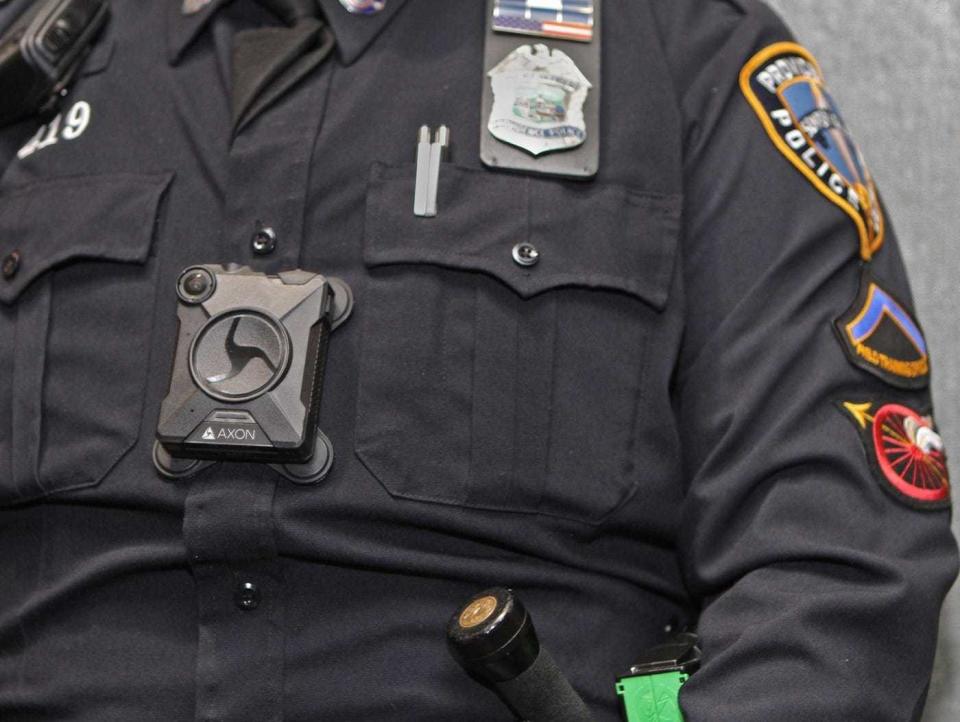Body-cam footage would be harder to get with this bill. Why advocates aren't happy about it.
- Oops!Something went wrong.Please try again later.
PROVIDENCE – Advocacy groups are warning about the potential loss of public access to police body-cam footage if the proposed rewrite of the state's police bill of rights clears the Senate this week.
The warning was issued by an amalgam of people and groups that includes:
Linda Lotridge Levin, professor emerita of journalism at the University of Rhode Island on behalf of ACCESS/RI
John Marion, executive director of Common Cause Rhode Island
Scott Pickering, general manager of East Bay Media Group
Justin Silverman, executive director of the New England First Amendment Coalition
Steven Brown, executive director of ACLU of Rhode Island.
The groups warn: "If enacted, this provision will require police departments to keep secret certain body-worn camera footage that otherwise could be sought under the Access to Public Records Act ... significantly impacting the public’s right to know."
Going deeper, the groups are raising alarms about a provision in the matching House and Senate bills that says a police chief “shall be prohibited from releasing any video evidence ... about or concerning an incident or matter of public interest" involving a police officer if it relates to suspensions imposed for undefined "minor” violations ofdepartmental rules.
House Judiciary Chairman Robert Craven told colleagues this references suspensions of up to five days for what he described as ticky-tacky violations, such as dress code violations or visible tattoos.
The concerns were raised but minimized ahead of the House passing the proposed reform of the state's oft-criticized Law Enforcement Officers' Bill of Rights.
In a joint statement on Monday, House Speaker K. Joseph Shekarchi and Senate President Dominick J. Ruggerio stood pat, insisting "The language in the bill does not change access to this information and only relates to disclosure by the police chief in circumstances where the officer is suspended for minor violations."
“Under current law, a police chief is prohibited from [even] discussing a summary suspension of this nature. The provision in the bill passed last week by the House does not change this in any way,'' they said.
But as the media and other open-government advocacy groups see it, the section bans access to body-camera footage whenever a "minor" violation of department rules is involved, even if the footage would otherwise have been accessible under existing public records law.
"What is a minor violation? It’s unclear," they wrote.
Technically, it means any violation that would not qualify for suspension of up to 14 day – reserved for a narrowly defined list of serious misconduct – and even more narrowly, any conduct that does not lead to a criminal charge.

More: 'I know I'll get by this': Senate President Ruggerio breaks silence on health, rumors of a coup
Hypothetical situations this would apply to:
The groups wrote that however minor violations are defined and whether it is intentional or not, the language creates a "gaping hole in police accountability and transparency,'' the groups wrote. They cited these three hypothetical examples:
An officer is allegedly disrespectful or uses inappropriate language with a member of the public during an encounter. "The public would never be able to see the footage to confirm (or deny) what the victim has alleged," the groups wrote.
A person complains they were struck by a police officer and the officer did not turn their body camera on until the end of the incident so the alleged abuse was not captured on video. The officer would be charged with a minor violation of failing to turn on the camera, so "the public would never be able to see footage that, by inference, might lend credence to the victim's allegations," the groups wrote.
A person alleges that police officers used excessive force against them during an arrest. "Reviewing the body-camera footage, the chief concludes that the force used did not rise to the level of a criminal assault, but that the arrest should have been handled more professionally. Again, the footage would be required to be kept secret under this provision," the groups wrote.
The groups urged the Senate to amend the legislation and send it back to the House.
"It is deeply troubling and sadly ironic that, as a result of this provision, a bill designed to promote greater police transparency does the opposite," their statement said. "And undermines the very purpose of having the cameras."
Looking ahead: Bill is headed to the Senate
Passed by the House on a 58-to-14 vote last Thursday, the legislation was sent to the Senate for what was expected to be a final vote this week before heading to Gov. Dan McKee's desk.
The two matching bills, including a version sponsored by Ruggerio, have not yet been scheduled for a Senate vote, however.
No official reason has been given, though Ruggerio, who last presided over the Senate on April 23, has been out sick since that date.
This article originally appeared on The Providence Journal: Advocates say this bill would make getting police body cam footage harder

